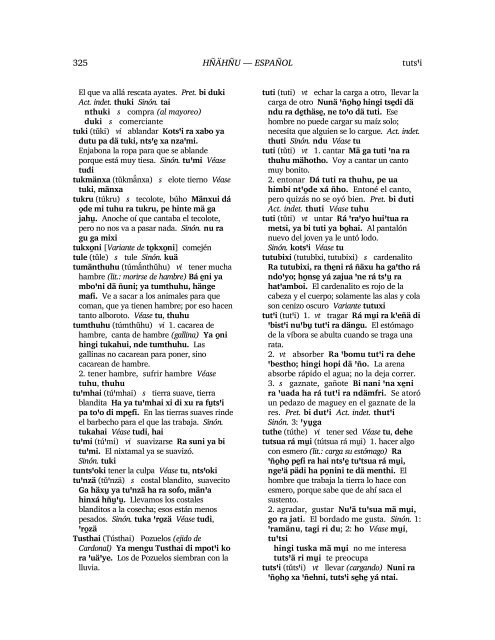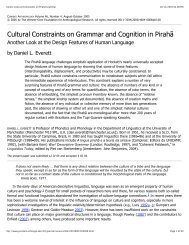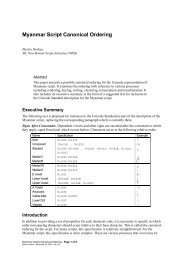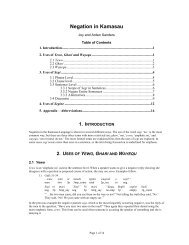- Page 1 and 2:
DICCIONARIO DEL HÑÄHÑU (OTOMÍ)
- Page 3 and 4:
DICCIONARIO DEL HÑÄHÑU (OTOMÍ)
- Page 5 and 6:
CONTENIDO Dedicatoria vii Reconocim
- Page 7 and 8:
A la memoria de la maestra Angélic
- Page 9 and 10:
ix Dedicatoria En 1951 se estableci
- Page 11 and 12:
RECONOCIMIENTO El presente dicciona
- Page 13 and 14:
Luis Hernández Cruz y Emilia Pére
- Page 15 and 16:
INTRODUCCIÓN Me da gran placer int
- Page 17 and 18:
LA ESCRITURA DEL HÑÄHÑU Las letr
- Page 19 and 20:
xix La escritura Con muy pocas exce
- Page 21 and 22:
xxi La escritura gá xipi tú le di
- Page 23 and 24:
1. El artículo sencillo ESTRUCTURA
- Page 25 and 26:
xxv Estructura de la entrada dokjä
- Page 27:
DICCIONARIO HÑÄHÑU - ESPAÑOL
- Page 30 and 31:
ai HÑÄHÑU — ESPAÑOL 4 yo coma
- Page 32 and 33:
arhmä HÑÄHÑU — ESPAÑOL 6 arh
- Page 34 and 35:
ät�i HÑÄHÑU — ESPAÑOL 8 d
- Page 36 and 37:
azu HÑÄHÑU — ESPAÑOL 10 rompi
- Page 38 and 39:
en�i HÑÄHÑU — ESPAÑOL 12 be
- Page 40 and 41:
oladejuego HÑÄHÑU — ESPAÑOL 1
- Page 42 and 43:
á HÑÄHÑU — ESPAÑOL 16 bo̱
- Page 44 and 45:
�babga HÑÄHÑU — ESPAÑOL 18
- Page 46 and 47:
�bane HÑÄHÑU — ESPAÑOL 20 c
- Page 48 and 49:
�bathä HÑÄHÑU — ESPAÑOL 22
- Page 50 and 51:
�be̱fi HÑÄHÑU — ESPAÑOL 24
- Page 52 and 53:
�be̱t�i HÑÄHÑU — ESPAÑOL
- Page 54 and 55:
�Bi�tho̱ HÑÄHÑU — ESPAÑO
- Page 56 and 57:
�bosta HÑÄHÑU — ESPAÑOL 30
- Page 58 and 59:
�bo̱t�e HÑÄHÑU — ESPAÑOL
- Page 60 and 61:
da HÑÄHÑU — ESPAÑOL 34 2. dev
- Page 62 and 63:
dä HÑÄHÑU — ESPAÑOL 36 beni
- Page 64 and 65:
däme HÑÄHÑU — ESPAÑOL 38 hiz
- Page 66 and 67:
dänga the̱ki HÑÄHÑU — ESPAÑ
- Page 68 and 69:
dätso̱ HÑÄHÑU — ESPAÑOL 42
- Page 70 and 71:
denda HÑÄHÑU — ESPAÑOL 44 Jua
- Page 72 and 73:
de̱pe̱ HÑÄHÑU — ESPAÑOL 46
- Page 74 and 75:
do HÑÄHÑU — ESPAÑOL 48 do (do
- Page 76 and 77:
dont�i HÑÄHÑU — ESPAÑOL 50
- Page 78 and 79:
do̱ni HÑÄHÑU — ESPAÑOL 52 2.
- Page 80 and 81:
dungo̱k�ei HÑÄHÑU — ESPAÑO
- Page 82 and 83:
ehni HÑÄHÑU — ESPAÑOL 56 mi h
- Page 84 and 85:
e�yo HÑÄHÑU — ESPAÑOL 58 e
- Page 86 and 87:
e̱t�i HÑÄHÑU — ESPAÑOL 60
- Page 88 and 89:
fat�i HÑÄHÑU — ESPAÑOL 62 m
- Page 90 and 91:
fe̱�tsi HÑÄHÑU — ESPAÑOL 6
- Page 92 and 93:
fo̱ge HÑÄHÑU — ESPAÑOL 66 2.
- Page 94 and 95:
fu̱ni HÑÄHÑU — ESPAÑOL 68 de
- Page 96 and 97:
gädo HÑÄHÑU — ESPAÑOL 70 gä
- Page 98 and 99:
gepu̱ HÑÄHÑU — ESPAÑOL 72 mu
- Page 100 and 101:
go HÑÄHÑU — ESPAÑOL 74 �ñu
- Page 102 and 103:
grá HÑÄHÑU — ESPAÑOL 76 grá
- Page 104 and 105:
ha ra za HÑÄHÑU — ESPAÑOL 78
- Page 106 and 107:
hant�i HÑÄHÑU — ESPAÑOL 80
- Page 108 and 109:
häi HÑÄHÑU — ESPAÑOL 82 lo q
- Page 110 and 111:
hege HÑÄHÑU — ESPAÑOL 84 4. s
- Page 112 and 113:
hets�e HÑÄHÑU — ESPAÑOL 86
- Page 114 and 115:
he̱xki HÑÄHÑU — ESPAÑOL 88 3
- Page 116 and 117:
hmäki HÑÄHÑU — ESPAÑOL 90 Lo
- Page 118 and 119:
hmihi HÑÄHÑU — ESPAÑOL 92 la
- Page 120 and 121:
hnet�i HÑÄHÑU — ESPAÑOL 94
- Page 122 and 123:
hñane HÑÄHÑU — ESPAÑOL 96 2.
- Page 124 and 125:
hñänoya HÑÄHÑU — ESPAÑOL 98
- Page 126 and 127:
hñen�o̱ni HÑÄHÑU — ESPAÑO
- Page 128 and 129:
hño�ti HÑÄHÑU — ESPAÑOL 10
- Page 130 and 131:
hñu�sfu̱i HÑÄHÑU — ESPAÑO
- Page 132 and 133:
hoga �ñoi HÑÄHÑU — ESPAÑOL
- Page 134 and 135:
ho̱hnähñu̱�ti HÑÄHÑU — E
- Page 136 and 137:
hu HÑÄHÑU — ESPAÑOL 110 mis e
- Page 138 and 139:
huengadehe HÑÄHÑU — ESPAÑOL 1
- Page 140 and 141:
huits�i HÑÄHÑU — ESPAÑOL 11
- Page 142 and 143:
huthuhme HÑÄHÑU — ESPAÑOL 116
- Page 144 and 145:
hya�nga HÑÄHÑU — ESPAÑOL 11
- Page 146 and 147:
hyoya HÑÄHÑU — ESPAÑOL 120 to
- Page 148 and 149:
ita HÑÄHÑU — ESPAÑOL 122 ita
- Page 150 and 151:
jagetuu̱ HÑÄHÑU — ESPAÑOL 12
- Page 152 and 153:
jäne HÑÄHÑU — ESPAÑOL 126 j
- Page 154 and 155:
jostho HÑÄHÑU — ESPAÑOL 128 j
- Page 156 and 157:
juänthe HÑÄHÑU — ESPAÑOL 130
- Page 158 and 159:
ju̱ni HÑÄHÑU — ESPAÑOL 132 t
- Page 160 and 161:
kats�i HÑÄHÑU — ESPAÑOL 134
- Page 162 and 163:
kät�i HÑÄHÑU — ESPAÑOL 136
- Page 164 and 165:
komo HÑÄHÑU — ESPAÑOL 138 2.
- Page 166 and 167:
kots�i HÑÄHÑU — ESPAÑOL 140
- Page 168 and 169:
kudu HÑÄHÑU — ESPAÑOL 142 tec
- Page 170 and 171:
ku̱hyadi HÑÄHÑU — ESPAÑOL 14
- Page 172 and 173:
ku̱xhyä HÑÄHÑU — ESPAÑOL 14
- Page 174 and 175:
k�ast�ade̱thä HÑÄHÑU — E
- Page 176 and 177:
k�o HÑÄHÑU — ESPAÑOL 150 m
- Page 178 and 179:
k�uamba HÑÄHÑU — ESPAÑOL 15
- Page 180 and 181:
ma HÑÄHÑU — ESPAÑOL 154 ma [F
- Page 182 and 183:
mahuifi HÑÄHÑU — ESPAÑOL 156
- Page 184 and 185:
ma�ñu HÑÄHÑU — ESPAÑOL 158
- Page 186 and 187:
ma�ä ra Zidada HÑÄHÑU — ESP
- Page 188 and 189:
mähuäni HÑÄHÑU — ESPAÑOL 16
- Page 190 and 191:
mängäi HÑÄHÑU — ESPAÑOL 164
- Page 192 and 193:
mäñä HÑÄHÑU — ESPAÑOL 166
- Page 194 and 195:
mbá HÑÄHÑU — ESPAÑOL 168 mul
- Page 196 and 197:
mbí HÑÄHÑU — ESPAÑOL 170 rom
- Page 198 and 199:
mboza HÑÄHÑU — ESPAÑOL 172 mb
- Page 200 and 201:
megi HÑÄHÑU — ESPAÑOL 174 don
- Page 202 and 203:
meta HÑÄHÑU — ESPAÑOL 176 met
- Page 204 and 205:
me̱m�yo HÑÄHÑU — ESPAÑOL 1
- Page 206 and 207:
mfe HÑÄHÑU — ESPAÑOL 180 2. s
- Page 208 and 209:
mfo�ye̱ HÑÄHÑU — ESPAÑOL 1
- Page 210 and 211:
minza HÑÄHÑU — ESPAÑOL 184 yo
- Page 212 and 213:
mot�andehe HÑÄHÑU — ESPAÑOL
- Page 214 and 215:
mpa�ti HÑÄHÑU — ESPAÑOL 188
- Page 216 and 217:
mpo̱nthe HÑÄHÑU — ESPAÑOL 19
- Page 218 and 219:
Mundotso̱ HÑÄHÑU — ESPAÑOL 1
- Page 220 and 221:
�magyä HÑÄHÑU — ESPAÑOL 19
- Page 222 and 223:
�me̱hni HÑÄHÑU — ESPAÑOL 1
- Page 224 and 225:
�moda HÑÄHÑU — ESPAÑOL 198
- Page 226 and 227:
n- HÑÄHÑU — ESPAÑOL 200 n- pr
- Page 228 and 229:
ndaju̱ HÑÄHÑU — ESPAÑOL 202
- Page 230 and 231:
ndäni HÑÄHÑU — ESPAÑOL 204 n
- Page 232 and 233:
ndengi HÑÄHÑU — ESPAÑOL 206 m
- Page 234 and 235:
ndo̱ HÑÄHÑU — ESPAÑOL 208 nd
- Page 236 and 237:
ndu̱lu̱ HÑÄHÑU — ESPAÑOL 21
- Page 238 and 239:
neua HÑÄHÑU — ESPAÑOL 212 ha
- Page 240 and 241:
nge�ä HÑÄHÑU — ESPAÑOL 214
- Page 242 and 243:
nguat�i HÑÄHÑU — ESPAÑOL 21
- Page 244 and 245:
nguxju̱ HÑÄHÑU — ESPAÑOL 218
- Page 246 and 247:
njabu̱tho HÑÄHÑU — ESPAÑOL 2
- Page 248 and 249:
njot�ts�u̱di HÑÄHÑU — ESP
- Page 250 and 251:
nju̱xi HÑÄHÑU — ESPAÑOL 224
- Page 252 and 253:
nkumä�rihi HÑÄHÑU — ESPAÑO
- Page 254 and 255:
nk�o�ni HÑÄHÑU — ESPAÑOL
- Page 256 and 257:
no̱ts�e HÑÄHÑU — ESPAÑOL 2
- Page 258 and 259:
Nsefi HÑÄHÑU — ESPAÑOL 232 de
- Page 260 and 261:
nsu̱t�amu̱i HÑÄHÑU — ESPA
- Page 262 and 263:
ntrasista HÑÄHÑU — ESPAÑOL 23
- Page 264 and 265:
nt�atsi HÑÄHÑU — ESPAÑOL 23
- Page 266 and 267:
nt�e̱ndo HÑÄHÑU — ESPAÑOL
- Page 268 and 269:
Nt�o̱ho̱ Mponza HÑÄHÑU — E
- Page 270 and 271:
nthämfeni HÑÄHÑU — ESPAÑOL 2
- Page 272 and 273:
nthe̱ts�i HÑÄHÑU — ESPAÑOL
- Page 274 and 275:
ntho̱ge HÑÄHÑU — ESPAÑOL 248
- Page 276 and 277:
nthu̱t�i HÑÄHÑU — ESPAÑOL
- Page 278 and 279:
ntsots�i HÑÄHÑU — ESPAÑOL 2
- Page 280 and 281:
nts�i HÑÄHÑU — ESPAÑOL 254
- Page 282 and 283:
nubu̱ HÑÄHÑU — ESPAÑOL 256 d
- Page 284 and 285:
nu�u̱ HÑÄHÑU — ESPAÑOL 258
- Page 286 and 287:
nxidi HÑÄHÑU — ESPAÑOL 260 nx
- Page 288 and 289:
nzaki HÑÄHÑU — ESPAÑOL 262 nj
- Page 290 and 291:
Nzixits�o HÑÄHÑU — ESPAÑOL
- Page 292 and 293:
nzu̱nt�at�e̱gi HÑÄHÑU —
- Page 294 and 295:
�no̱ndo HÑÄHÑU — ESPAÑOL 2
- Page 296 and 297:
ñäpi HÑÄHÑU — ESPAÑOL 270
- Page 298 and 299:
ño�ki HÑÄHÑU — ESPAÑOL 272
- Page 300 and 301: �Ñastho̱ HÑÄHÑU — ESPAÑOL
- Page 302 and 303: �ñät�ek�ei HÑÄHÑU — ES
- Page 304 and 305: �ñethi HÑÄHÑU — ESPAÑOL 27
- Page 306 and 307: �ño̱ HÑÄHÑU — ESPAÑOL 280
- Page 308 and 309: �ñut�i HÑÄHÑU — ESPAÑOL
- Page 310 and 311: ofo HÑÄHÑU — ESPAÑOL 284 2. a
- Page 312 and 313: o̱nga ra du HÑÄHÑU — ESPAÑOL
- Page 314 and 315: Padingo̱ HÑÄHÑU — ESPAÑOL 28
- Page 316 and 317: panxido HÑÄHÑU — ESPAÑOL 290
- Page 318 and 319: pänts�ahai HÑÄHÑU — ESPAÑO
- Page 320 and 321: pe�ye̱ HÑÄHÑU — ESPAÑOL 29
- Page 322 and 323: pe̱thme HÑÄHÑU — ESPAÑOL 296
- Page 324 and 325: pobo HÑÄHÑU — ESPAÑOL 298 enc
- Page 326 and 327: po̱ge HÑÄHÑU — ESPAÑOL 300 p
- Page 328 and 329: pura HÑÄHÑU — ESPAÑOL 302 2.
- Page 330 and 331: epela HÑÄHÑU — ESPAÑOL 304 re
- Page 332 and 333: �ramäts�u̱ HÑÄHÑU — ESPA
- Page 334 and 335: �re̱t�a HÑÄHÑU — ESPAÑOL
- Page 336 and 337: samän�atsi HÑÄHÑU — ESPAÑO
- Page 338 and 339: sifi HÑÄHÑU — ESPAÑOL 312 sif
- Page 340 and 341: su̱za HÑÄHÑU — ESPAÑOL 314 s
- Page 342 and 343: tat�mäni HÑÄHÑU — ESPAÑOL
- Page 344 and 345: te�be̱�ä HÑÄHÑU — ESPAÑ
- Page 346 and 347: te̱ni HÑÄHÑU — ESPAÑOL 320 t
- Page 348 and 349: tondäñ�ä HÑÄHÑU — ESPAÑO
- Page 352 and 353: tu�hme HÑÄHÑU — ESPAÑOL 326
- Page 354 and 355: t�axä the̱t�ue HÑÄHÑU —
- Page 356 and 357: t�et�a de̱thä HÑÄHÑU — E
- Page 358 and 359: t�oxi HÑÄHÑU — ESPAÑOL 332
- Page 360 and 361: t�u̱�ñäi HÑÄHÑU — ESPA
- Page 362 and 363: thäki HÑÄHÑU — ESPAÑOL 336 t
- Page 364 and 365: these̱he̱ HÑÄHÑU — ESPAÑOL
- Page 366 and 367: the̱�ti HÑÄHÑU — ESPAÑOL 3
- Page 368 and 369: tho̱dri HÑÄHÑU — ESPAÑOL 342
- Page 370 and 371: thu̱�mi HÑÄHÑU — ESPAÑOL 3
- Page 372 and 373: tsat�añ�i HÑÄHÑU — ESPAÑ
- Page 374 and 375: tse̱�mtho HÑÄHÑU — ESPAÑOL
- Page 376 and 377: tsi�yu̱i HÑÄHÑU — ESPAÑOL
- Page 378 and 379: tsu̱ HÑÄHÑU — ESPAÑOL 352 ma
- Page 380 and 381: ts�anango HÑÄHÑU — ESPAÑOL
- Page 382 and 383: Ts�indehe HÑÄHÑU — ESPAÑOL
- Page 384 and 385: ts�one HÑÄHÑU — ESPAÑOL 358
- Page 386 and 387: ts�u̱tho HÑÄHÑU — ESPAÑOL
- Page 388 and 389: uaro HÑÄHÑU — ESPAÑOL 362 3.
- Page 390 and 391: udi HÑÄHÑU — ESPAÑOL 364 tsi
- Page 392 and 393: ut�i HÑÄHÑU — ESPAÑOL 366 u
- Page 394 and 395: �ue̱ne HÑÄHÑU — ESPAÑOL 36
- Page 396 and 397: u̱tsate HÑÄHÑU — ESPAÑOL 370
- Page 398 and 399: xagyä HÑÄHÑU — ESPAÑOL 372 x
- Page 400 and 401:
xaxi HÑÄHÑU — ESPAÑOL 374 xax
- Page 402 and 403:
xehai HÑÄHÑU — ESPAÑOL 376 nu
- Page 404 and 405:
xida HÑÄHÑU — ESPAÑOL 378 ―
- Page 406 and 407:
xindo HÑÄHÑU — ESPAÑOL 380 xi
- Page 408 and 409:
xits�ni HÑÄHÑU — ESPAÑOL 38
- Page 410 and 411:
xot�o HÑÄHÑU — ESPAÑOL 384
- Page 412 and 413:
xui HÑÄHÑU — ESPAÑOL 386 ts
- Page 414 and 415:
yerbamuro HÑÄHÑU — ESPAÑOL 38
- Page 416 and 417:
yu HÑÄHÑU — ESPAÑOL 390 sombr
- Page 418 and 419:
�ye̱gi HÑÄHÑU — ESPAÑOL 39
- Page 420 and 421:
�yonde HÑÄHÑU — ESPAÑOL 394
- Page 422 and 423:
�yo̱t�atuhni HÑÄHÑU — ESP
- Page 424 and 425:
zando̱ HÑÄHÑU — ESPAÑOL 398
- Page 426 and 427:
ze̱sthi HÑÄHÑU — ESPAÑOL 400
- Page 428 and 429:
ziui HÑÄHÑU — ESPAÑOL 402 ziu
- Page 430 and 431:
zuzu HÑÄHÑU — ESPAÑOL 404 Tam
- Page 433 and 434:
A a prep ha a cada rato jagetuu̱ a
- Page 435 and 436:
409 ESPAÑOL — HÑÄHÑU aguantar
- Page 437 and 438:
411 ESPAÑOL — HÑÄHÑU anciana
- Page 439 and 440:
413 ESPAÑOL — HÑÄHÑU arrebata
- Page 441 and 442:
415 ESPAÑOL — HÑÄHÑU azotador
- Page 443 and 444:
417 ESPAÑOL — HÑÄHÑU boda bar
- Page 445 and 446:
419 ESPAÑOL — HÑÄHÑU cada bue
- Page 447 and 448:
421 ESPAÑOL — HÑÄHÑU Capula c
- Page 449 and 450:
423 ESPAÑOL — HÑÄHÑU ceñidor
- Page 451 and 452:
425 ESPAÑOL — HÑÄHÑU comer cl
- Page 453 and 454:
427 ESPAÑOL — HÑÄHÑU controla
- Page 455 and 456:
429 ESPAÑOL — HÑÄHÑU Cuamxhi
- Page 457 and 458:
431 ESPAÑOL — HÑÄHÑU chinicui
- Page 459 and 460:
433 ESPAÑOL — HÑÄHÑU deshilac
- Page 461 and 462:
435 ESPAÑOL — HÑÄHÑU doblegar
- Page 463 and 464:
437 ESPAÑOL — HÑÄHÑU empeorar
- Page 465 and 466:
439 ESPAÑOL — HÑÄHÑU entero e
- Page 467 and 468:
441 ESPAÑOL — HÑÄHÑU esquilar
- Page 469 and 470:
443 ESPAÑOL — HÑÄHÑU finado e
- Page 471 and 472:
445 ESPAÑOL — HÑÄHÑU girasol
- Page 473 and 474:
447 ESPAÑOL — HÑÄHÑU hambre g
- Page 475 and 476:
449 ESPAÑOL — HÑÄHÑU huella h
- Page 477 and 478:
451 ESPAÑOL — HÑÄHÑU jacal in
- Page 479 and 480:
453 ESPAÑOL — HÑÄHÑU leche La
- Page 481 and 482:
455 ESPAÑOL — HÑÄHÑU machetaz
- Page 483 and 484:
457 ESPAÑOL — HÑÄHÑU martín
- Page 485 and 486:
459 ESPAÑOL — HÑÄHÑU mirar me
- Page 487 and 488:
461 ESPAÑOL — HÑÄHÑU nada mos
- Page 489 and 490:
463 ESPAÑOL — HÑÄHÑU ofrenda
- Page 491 and 492:
465 ESPAÑOL — HÑÄHÑU paloma o
- Page 493 and 494:
467 ESPAÑOL — HÑÄHÑU pelar pa
- Page 495 and 496:
469 ESPAÑOL — HÑÄHÑU pinole p
- Page 497 and 498:
471 ESPAÑOL — HÑÄHÑU presumir
- Page 499 and 500:
473 ESPAÑOL — HÑÄHÑU quedar P
- Page 501 and 502:
475 ESPAÑOL — HÑÄHÑU redondea
- Page 503 and 504:
477 ESPAÑOL — HÑÄHÑU rico rep
- Page 505 and 506:
479 ESPAÑOL — HÑÄHÑU San Juan
- Page 507 and 508:
481 ESPAÑOL — HÑÄHÑU sin seme
- Page 509 and 510:
483 ESPAÑOL — HÑÄHÑU tallar s
- Page 511 and 512:
485 ESPAÑOL — HÑÄHÑU tirador
- Page 513 and 514:
487 ESPAÑOL — HÑÄHÑU traspasa
- Page 515 and 516:
489 ESPAÑOL — HÑÄHÑU Valle de
- Page 517 and 518:
491 ESPAÑOL — HÑÄHÑU volver v
- Page 519:
493 ESPAÑOL — HÑÄHÑU zurdo Za
- Page 523 and 524:
NOTAS SOBRE LA GRAMÁTICA DEL HÑÄ
- Page 525 and 526:
499 2. La forma de la voz pasiva im
- Page 527 and 528:
501 4. El verbo derivado de un sust
- Page 529 and 530:
503 8. Sustantivo usado como predic
- Page 531 and 532:
505 9. Los proclíticos gramaticale
- Page 533 and 534:
507 10. Sufijos temáticos Cuadro 1
- Page 535 and 536:
509 11. Los sufijos pronominales de
- Page 537 and 538:
511 11. Los sufijos pronominales de
- Page 539 and 540:
513 13. Adjetivos Si hay un morfema
- Page 541 and 542:
515 14. Las palabras compuestas y l
- Page 543 and 544:
ÍNDICE DE LAS NOTAS GRAMATICALES N
- Page 545:
BIBLIOGRAFÍA
- Page 548 and 549:
DICCIONARIO HÑÄHÑU (OTOMÍ) 522
- Page 550 and 551:
DICCIONARIO HÑÄHÑU (OTOMÍ) 524
- Page 552 and 553:
DICCIONARIO HÑÄHÑU (OTOMÍ) 526
- Page 554:
DICCIONARIO HÑÄHÑU (OTOMÍ) 528

















